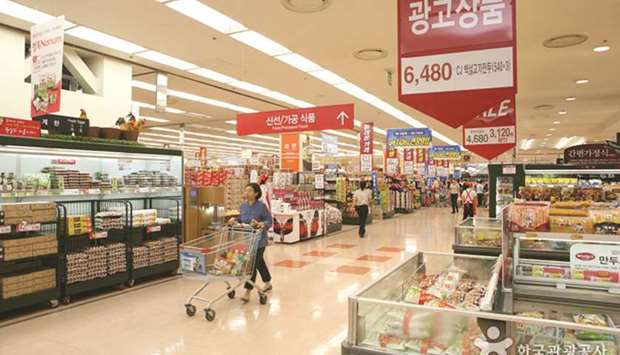The Ministry of Environment, the Korean National Council of Consumer Organisations, and five domestic supermarket chains – Nonghyup Hanaro Mart, Lotte Mart, Mega Mart, E-mart, and Homeplus – agreed to reduce the use specifically of plastic for packaging, which needs management measures as it lies on the blind side of regulations, the ministry said in an April 26 statement.
In a 2016-2017 survey in Seoul, participants said they use plastic bags on an average of 57.1% of their grocery shopping trips, but they buy products with some form of plastic internal packaging 100% of the time.
The latest agreement set a goal to reduce internal packaging use by 50%.
“We recognise that the sales and consumption behaviour pursuing convenience is wasting resources and undermining the precious living environment in which we and our descendants can live,” the voluntary agreement reads. “Therefore, operators of large-scale markets will save resources by establishing a healthy consumption culture.”
They also vowed to reduce the use of disposable bags and shopping bags except for fish, meat, vegetables, and products with moist surfaces and synthetic resin material packaging for refrigerated products that produce moisture at room temperature.
Instead of supplying disposable plastic bags, they will sell recyclable garbage bags and supply shopping baskets and empty boxes for patrons.
In South Korea, garbage and recycle bags are pretaxed to cover waste management costs and specially sold by each district or city.
Large-scale stores are prohibited from providing free disposable plastic bags under the the Act on the Promotion of Saving and Recycling of Resources, but circumstances suggest that paper bags and internal packaging plastic bags, which are not subject to regulation, are easily being used without legal management means, the ministry said.
Stores will ditch coated Styrofoam trays and try to opt for colourless and non coated trays, which are easier to recycle, the ministry said.
They will also reel back the practice of bundling products with plastic packaging during sale events and inspect and limit the sale of products with excessive packaging, the ministry said.
An environment ministry official, who was not authorized to be named, said limiting excessive packaging would ultimately affect product suppliers.
But suppliers “could adjust to this by voluntarily adjusting their production or packaging process to have a more positive impact on our environment,” he told Bloomberg Environment on April 27.
As the agreement involves the Korean National Council of Consumer Organizations, a civilian group, the next step in the agreement will be to monitor its implementation with the group’s cooperation, the official said.
“We were monitoring excessive packaging even before the agreement, but with this agreement, we will continue to monitor the status through the civilian group,” he said.

